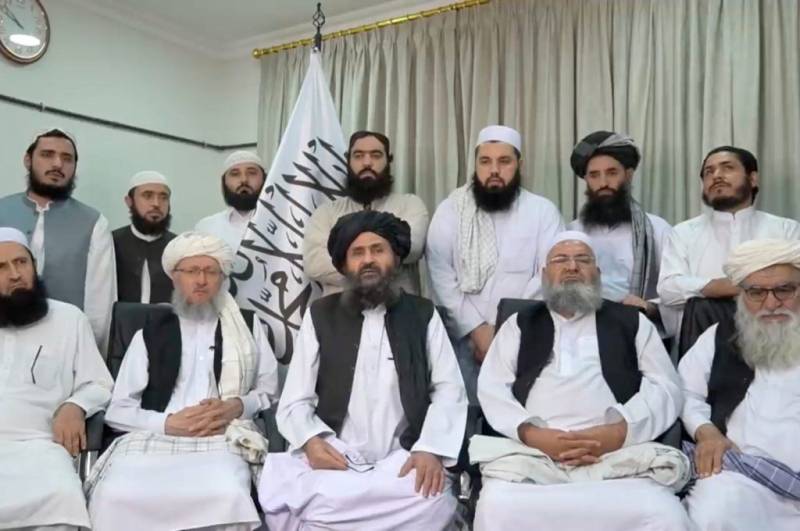No woman inducted in ‘Mullahs-dominated’ interim setup in Afghanistan

Stay tuned with 24 News HD Android App

After the US pullout the Taliban have taken control of Afghanistan and started running the war-ravaged country according to their model of the Islamic system.
On Tuesday, Taliban spokesperson Zabihullah Mujahid announced the names of the leaders who will hold important positions in the new setup that will be interim in nature.
This means the portfolios of the incumbents can be shuffled according to the requirements of the unfolding situation. Likewise, more people can be inducted to diversify the setup and make it ‘inclusive’ as demanded by the world community.
In its present shape Mullahs-dominated setup cannot be called ‘inclusive’ because it’s not clear whether Tajiks, Hazaras and Uzbeks have the representation in it.
Also, no woman has been included in the cabinet, a factor of which the world will take a serious notice.
Taliban’s attitude towards women will play an important role in molding international community’s opinion of the new rulers – all turbaned, all bearded.
If the women were not given adequate representation in the cabinet many countries will get an excuse to not recognize the Taliban setup.
Nobody should forget that only three countries had recognized the 1996-2001 Taliban government. They were Pakistan, Saudi Arabia and UAE.
Even other Islamic countries with progressive thinking had not recognized the Islamic Emirate of Afghanistan because of their respective reservations about the Taliban.
As of now not a single country has accorded recognition to the new setup and all countries are waiting for the emerging situation before taking any decision on this important matter.
Ostensibly, the Taliban have learnt from their past experience and have created flexibility in their policies.
This is reflected in a policy statement issued by Amir-ul-Mominin Shaikh –ul-Hadith Hibatullah Akhundzada, which seems very encouraging.
It assures all countrymen that all matters of governance and life in Afghanistan will be regulated by the laws of the Holy Sharia.
“We want to have a peaceful, prosperous, and self-reliant Afghanistan, for which we will strive to eliminate all causes of war and strife in the country, and our countrymen to live in complete security and comfort”.
About relations with other countries, the statement said: “We want strong and healthy relations with our neighbors and all other countries based on mutual respect and interaction. Our relations with those countries will be based on the highest interests and benefits of Afghanistan. We are committed to all international laws and treaties, resolutions and commitments that are not in conflict with Islamic law and the country's national values. We also call on the countries of the world to value building strong and cordial political, diplomatic and good relations with us and to also cooperate with us”.
The new government is committed to taking serious and effective steps towards protecting human rights, the rights of minorities as well as the rights of the underprivileged groups within the framework of the demands of the sacred religion of Islam.
This undertaking should satisfy all those who have special concern for human rights and were unsure about the future designs of the Taliban.
The new government is sending strong signals that it has no plans to take revenge from anyone, which is certainly a very positive attitude. It will improve the image of the Taliban after their announcement of general amnesty.
The supreme leader’s statement says: All Afghans, without distinction or exception, will have the right to live with dignity and peace in their own country, their lives, property and honor will be protected. The Islamic Emirate will strive to protect the Islamic rights of every individual and will provide a safe and comfortable environment for them inside their country.
Refuting the previous impression about the Taliban, the top Afghan leader says: Education will be a priority for the new government.
“Our government will have a duty to provide a healthy and safe environment for religious and modern sciences to all countrymen within the framework of Sharia.
We will pave the way for the country's development in the field of education and build our country with knowledge and understanding”.
The Taliban’s media policy seems very encouraging.
According to Hibatullah Akhundaza’s statement, “We will work for the freedom, functioning and improvement of the media quality. We consider it our duty to take into account the sacred precepts of Islam, the national interests of the country and impartiality in our broadcasts”.
As for relations with other countries, the statement says: “Our message to our neighbors, the region and the world is that Afghanistan's soil will not be used against the security of any other country. We assure all that there is no concern from Afghanistan and we expect from them the same.”
It said: “We assure all foreign diplomats, embassies, consulates, humanitarian organizations and investors in the country that they will not face any problem. The Islamic Emirate is doing its best for their complete security and safety. Their presence is need of our country, so they should carry out their work with a peace of mind.
“We do not want enmity with anyone. Afghanistan is the common home of all. We will respect all their rights and legitimate aspirations and use their potential to rebuild the country.
“All talented and professional people, scholars, professors, doctors, scientists, engineers and educated cadres, national businessmen and investors should be fully assured that the Islamic Emirate will value them. Our country desperately needs their talents, guidance and work.
Similarly, people should not try to leave the country. The Islamic Emirate has no problem with anyone. All will take part in strengthening the system and Afghanistan and in this way, we will rebuild our war-torn country. The Islamic Emirate assures everyone in this regard”.
All these assurances are very encouraging and timely. However, the real issue is whether the Taliban will walk the talk.
